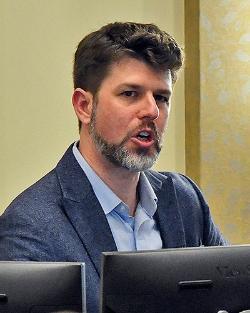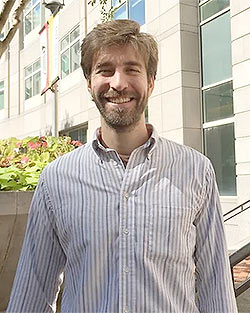May 20, 2024 | Jon Kelvey
The University of Maryland School of Medicine (UMSOM) hosted the Kahlert Institute for Addiction Medicine’s Inaugural Research Symposium on Monday, May 6 at the school’s Baltimore campus.
The symposium featured a keynote presentation by Margaret Haney, PhD, Professor of Neurobiology at Columbia University on Cannabis Use Disorder and more than a dozen researchers and addiction experts from UMSOM, and other universities and research institutions. They presented talks and posters on the current state of the science in addiction research. Alyssa Lord, Deputy Secretary for Behavioral Health at the Maryland Department of Health, gave opening remarks.
 "The depth and breadth of scientific research showcased by the world-renowned presenters certainly speaks to the critical need to address every aspect of addiction medicine," said Ellen Myers, Executive Director of the Kahlert Foundation. "The Kahlert Foundation is proud to support this comprehensive institute promoting collaboration, research, and treatment to uncover new therapies and, someday, a cure for the devastating disease of addiction."
"The depth and breadth of scientific research showcased by the world-renowned presenters certainly speaks to the critical need to address every aspect of addiction medicine," said Ellen Myers, Executive Director of the Kahlert Foundation. "The Kahlert Foundation is proud to support this comprehensive institute promoting collaboration, research, and treatment to uncover new therapies and, someday, a cure for the devastating disease of addiction."
UMSOM presenters included Seth Ament, PhD, Associate Professor of Psychiatry and researcher at the Institute for Genome Sciences, who discussed how studying the genetics of individual brain cell types could lead to better medications to treat addictions. Neurobiology Research Associate David Martin, PhD, discussed how psychedelic drugs could affect opioid use disorder in humans. Mary Kay Lobo, PhD, Professor of Neurobiology discussed research on prenatal cannabis exposure. Brian Mathur, PhD, Associate Professor of Pharmacology, and Melanie Bennett, PhD, Professor of Psychiatry, presented their research into the systems neuroscience of alcohol use disorder and the treatment of tobacco addiction in psychiatric settings, respectively.
There is a real need for more medications for treating substance use disorders, Dr. Ament said in his presentation, and that means identifying new areas of the brain to target when developing medications. “We need more tools to do a more precise job of treating people’s addictions,” he said. “The challenge is that most of the drugs we are working with are based on the idea that the brain is like a bag of chemicals, and that doesn’t get at all the complexity of all the changes happening in the brain.”
Specific neuronal cell types play unique roles in brain function. Over the past few years, Dr. Ament explained, researchers have used a relatively new technology called single nucleus RNA sequencing (snRNAseq), that allows them to identify gene expression in individual neurons from sampled brain tissue. For instance, more than 5,000 individual brain cell types have been identified in the mouse brain and ongoing research is mapping the variation of cell types in the human brain, which likely has more variation than what is found in a mouse brain.
 Dr. Ament and his colleagues, including Drs. Lobo and Mathur, have been using snRNAseq in preclinical research into what genes change in mice in the context of substance use disorders. They identified around 100 genes that are modified in certain brain cell types in animals exposed to alcohol. Further research may show similar genes in humans to be the most promising targets for new medications, Dr. Ament said. One of the goals of the Kahlert Institute will be to establish a human brain tissue bank for conducting the same kind of addiction research with human brain samples.
Dr. Ament and his colleagues, including Drs. Lobo and Mathur, have been using snRNAseq in preclinical research into what genes change in mice in the context of substance use disorders. They identified around 100 genes that are modified in certain brain cell types in animals exposed to alcohol. Further research may show similar genes in humans to be the most promising targets for new medications, Dr. Ament said. One of the goals of the Kahlert Institute will be to establish a human brain tissue bank for conducting the same kind of addiction research with human brain samples.
“This first symposium exemplifies how the Kahlert Institute will uniquely bring together physicians and neuroscientists to study the brain mechanisms underlying substance abuse and its consequences," said Mark T. Gladwin, MD, who is the Dean of the University of Maryland School of Medicine, Vice President for Medical Affairs, University of Maryland, Baltimore, and the John Z. and Akiko K. Bowers Distinguished Professor. "Based on the research presented, we need to learn more about the triggers for epigenetic changes and whether we can manipulate these alterations of gene expression to better understand what gives rise to alcohol or drug dependence in some individuals but not in others."
 Dr. Martin addressed his ongoing research into how classical psychedelics--drugs that produce similar subjective experiences to and operate in similar ways in the brain as LSD--may affect the course of addiction. Martin’s research utilizes 2,5-Dimethoxy-4-iodoamphetamine, also known as DOI to see whether use of the psychedelic can be helpful at curtailing cravings for opioids in the addicted brain.
Dr. Martin addressed his ongoing research into how classical psychedelics--drugs that produce similar subjective experiences to and operate in similar ways in the brain as LSD--may affect the course of addiction. Martin’s research utilizes 2,5-Dimethoxy-4-iodoamphetamine, also known as DOI to see whether use of the psychedelic can be helpful at curtailing cravings for opioids in the addicted brain.
Dr. Martin explained that rats reduce their consumption of the opioid drug fentanyl after being given DOI. He further showed that DOI acts by binding to the 5-HT2a receptor, a type of receptor that binds the neurotransmitter serotonin.
“This suggests that psychedelics are actually reducing the motivation for opioids,” Dr. Martin said, but cautioned that the work doesn’t yet prove psychedelics can attenuate opioid use in humans, and that a short-term reduction in opioid drug seeking may not translate into long-term abstinence. “Future experiments are going to be required to flesh out this idea and to see what kinds of long-term changes in behavior might result.”
 Dr. Lobo’s presentation described the signs of the rising prevalence of prenatal cannabis use among pregnant women, noting an increase of 170 percent between 2009 and 2016. The rate of prenatal exposure in the US is estimated at between 10 percent and 23 percent of pregnancies, she said, with self-reporting women citing the management of anxiety, mood disorders, and morning sickness nausea as reasons for using cannabis.
Dr. Lobo’s presentation described the signs of the rising prevalence of prenatal cannabis use among pregnant women, noting an increase of 170 percent between 2009 and 2016. The rate of prenatal exposure in the US is estimated at between 10 percent and 23 percent of pregnancies, she said, with self-reporting women citing the management of anxiety, mood disorders, and morning sickness nausea as reasons for using cannabis.
While many pregnant women who use cannabis believe the drug is harmless, Dr. Lobo pointed out research showing that delta-9-THC, the active component of cannabis, can cross the placenta and cause abnormalities for exposed people in infancy and adulthood. “There are deficits in memory, verbal and attention deficit, hyperactivity, impulsivity, and aggression,” she said. “And there’s a psychosis vulnerability in males.”
Through preclinical animal research, Dr. Lobo’s lab found that prenatal cannabis exposure alters the expression of genes, including those associated with mitochondrial function, which produces energy in cells. Her lab previously reported changes in mitochondrial function after prenatal cocaine exposure.
 But not all changes in gene expression are inherently associated with pathological changes, Dr. Lobo noted. Some research, she explained, found sex differences in how prenatal cannabis exposure affected the expression of genes related to mitochondrial function, with only male mice seeing impairment. “In females, the upregulation of genes we saw may be a protective mechanism.”
But not all changes in gene expression are inherently associated with pathological changes, Dr. Lobo noted. Some research, she explained, found sex differences in how prenatal cannabis exposure affected the expression of genes related to mitochondrial function, with only male mice seeing impairment. “In females, the upregulation of genes we saw may be a protective mechanism.”
“Fundamental research on the mechanisms that makes individual susceptible to addiction, and that drive addictive behaviors and relapse, and research on the biological changes caused by use of addictive substances—across the lifespan—are a critical mission of the Kahlert Institute for Addiction Medicine,” said Asaf Keller, PhD, the Donald E. Wilson Distinguished Professor and Chairman, Department of Neurobiology and the Associate Director of the Kahlert Institute. “Our mission is to harness this fundamental research, in both animal models and in humans, to develop novel therapies to address this generational challenge of addiction.”

Others in attendance included Jennie Osborne Burke, a writer and harm-reduction advocate, whose family generously supports the next generation of substance abuse researchers at the Kahlert Institute through the Matthew Osborne Research Fellowship, as well as research initiatives including recruitment of a senior research scientist for the Kahlert Institute for Addiction Medicine.
"The Inaugural Kahlert Institute symposium was a gathering of the most promising and compassionate minds on the forefront of the battle for addiction care," said Ms. Burke. "Despite the dire statistics of addiction-related death in our nation, the symposium reflected a collective belief that through commitment to research, innovation and policy making, addiction can be survivable and treatable. I left the symposium feeling hopeful and inspired, imagining a future in which no one loses a loved one to addiction, as I did."
Founded in 2023, the new Kahlert Institute for Addiction Medicine at the University of Maryland School of Medicine pools together leading addiction experts to focus their research and advanced clinical care on the goal of overcoming addiction. They include neuroscientists studying the brain mechanisms underlying addictions and physician educators working to train a new generation of medical students and residents. They also include clinicians providing a continuum of addiction care with evidence-based harm reduction measures that minimize the negative consequences of drug use on a patient’s overall health.
Contact
Jon Kelvey
Senior Writer
Office of Public Affairs and Communications
University of Maryland School of Medicine
JKelvey@som.umaryland.edu
Related stories

Friday, May 23, 2025
Kahlert Institute for Addiction Medicine Finds Innovative Approaches to Fighting Fourth Wave of Opioid Public Health Crisis
As the U.S. battles a fourth wave of a drug overdose public health crisis that is claiming 300 lives a day, the University of Maryland School of Medicine’s Kahlert Institute for Addiction Medicine marks two years since its founding with a renewed sense of mission and purpose: to find new treatments and approaches to discovery that will save lives and reverse the stigma associated with addiction.
